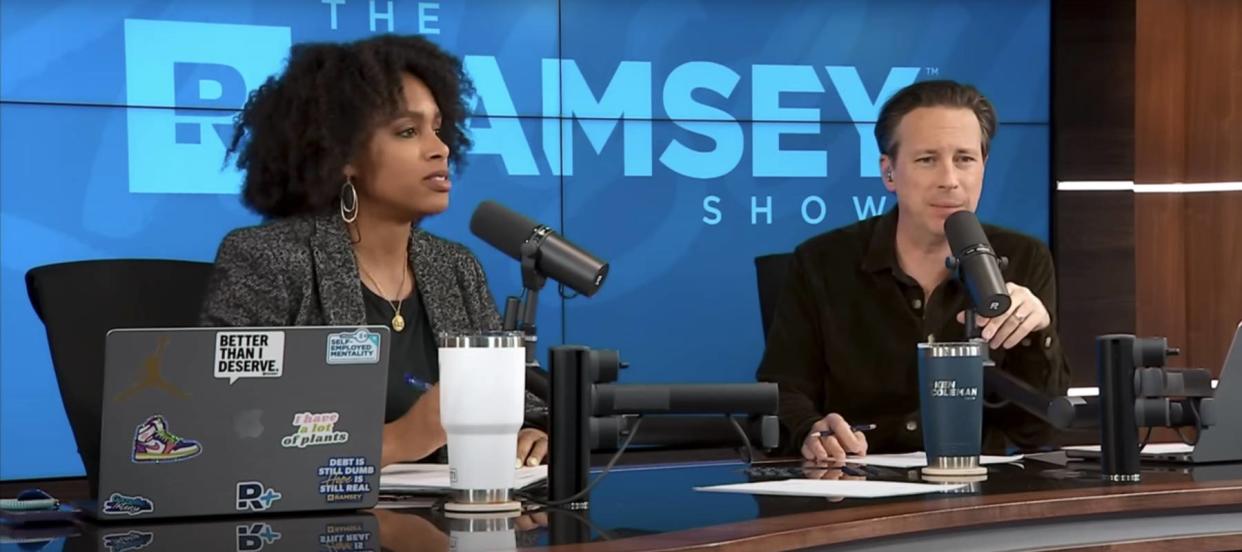'In over our heads': Texas couple puts 40% of their income toward mortgage. Here's why more homeowners have regrets about their purchase, and ways to handle it

Housing remains one of America’s favorite ways of getting into debt.
Even for relatively savvy savers — such as Rosalie from San Antonio, Texas —- high mortgage rates may not be enough to resist the temptation to overpay for a home.
Don't miss
Car insurance rates have spiked in the US to a stunning $2,150/year — but you can be smarter than that. Here's how you can save yourself as much as $820 annually in minutes (it's 100% free)
Thanks to Jeff Bezos, you can now use $100 to cash in on prime real estate — without the headache of being a landlord. Here's how
'It's not taxed at all': Warren Buffett shares the 'best investment' you can make when battling rising costs — take advantage today
In a conversation with “The Ramsey Show” co-hosts Jade Warshaw and Ken Coleman, she shared how she and her husband felt “in over our heads” about a property purchase.
Here’s why an increasing number of home buyers have regrets about their purchase.
Buyer's remorse
Buying a home is usually the biggest purchase a family ever makes, but with so few options available to buyers it's no surprise how difficult it can be to find the perfect dwelling. A whopping 90% of millennials have regrets about their first home purchase, according to Clever Real Estate’s 2024 Millennial Home Buyer Report, up from 82% the previous year. These include a bad location (27%), bad neighbors (26%) and elevated mortgage rates (25%).
Rosalie admits she’s part of that final cohort.
“I feel like it’s way too much money and I’m having a bit of remorse,” she said.
Last year, she and her husband sold their first home to buy a bigger property. Now, they’re paying $4,000 a month for their mortgage. That’s 40% of their $10,000 combined monthly income.
Although they clearly qualified for this mortgage, Warshaw believes they should have resisted the temptation to max out their purchasing power.
Read more: Suze Orman says Americans are poorer than they think — but having a dream retirement is so much easier when you know these 3 simple money moves
“They want you to spend, spend, spend because they get paid off that,” she said of banks and mortgage brokers.
In fact, Warshaw claims she and her husband were once approved for mortgage payments up to 50% of their combined income and decided to turn down the offer.
Luckily, Rosalie and her husband have avoided all forms of consumer debt. Their vehicles are fully paid off, they have no student loans and no credit card debt. Besides the mortgage, one of their biggest expenses is child care for their three-year old, which amounts to $150 a week.
Their relatively strong financial position gives them the opportunity to consider two potential solutions to their housing issue.
Two potential solutions
Warshaw and Coleman both agree Rosalie is overpaying for her home. They believe her monthly mortgage payments should be no more than 25% to 30% of her family’s monthly income.
However, they have different solutions to get there. Coleman recommends selling the home and downsizing. This is despite the fact that closing costs could chew into Rosalie’s home equity.
“Take the hit and you get out with very little stress,” he said. “Learn from this and move on.”
Warshaw, however, prefers keeping the home and boosting income. The closing costs are unnecessary, in her view, if Rosalie can make her monthly payments more manageable.
“If you can make it work for a year stay, if you can’t put food on the table get out,” she said.
Rosalie was leaning towards Rosalie’s solution, since her lack of debt made the mortgage more manageable. She also claims her husband’s second vehicle could be sold for $15,000 to cover some of the expenses.
If Rosalie and her husband are in as stable a financial situation as she claims, they may be able to stick it out for a while longer and kick the can a little bit down the line.
What to read next
Jeff Bezos told his siblings to invest $10K in his startup called Amazon, and now their stake is worth over $1B — 3 ways to get rich without having to gamble on risky public stocks
Car insurance premiums in America are through the roof — and only getting worse. But 5 minutes could have you paying as little as $29/month
Rich young Americans have lost confidence in the stock market — and are betting on these 3 assets instead. Get in now for strong long-term tailwinds
This article provides information only and should not be construed as advice. It is provided without warranty of any kind.
